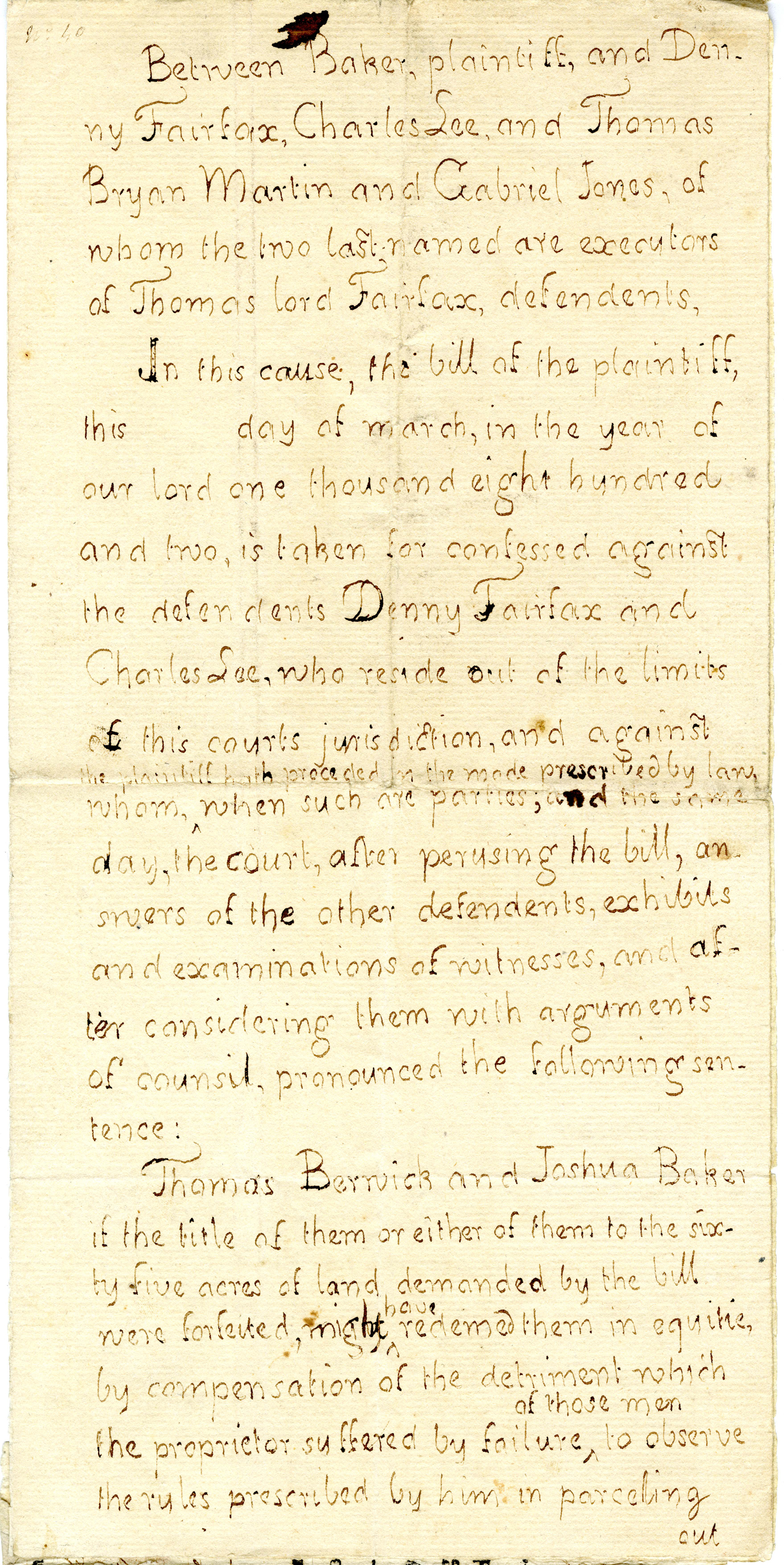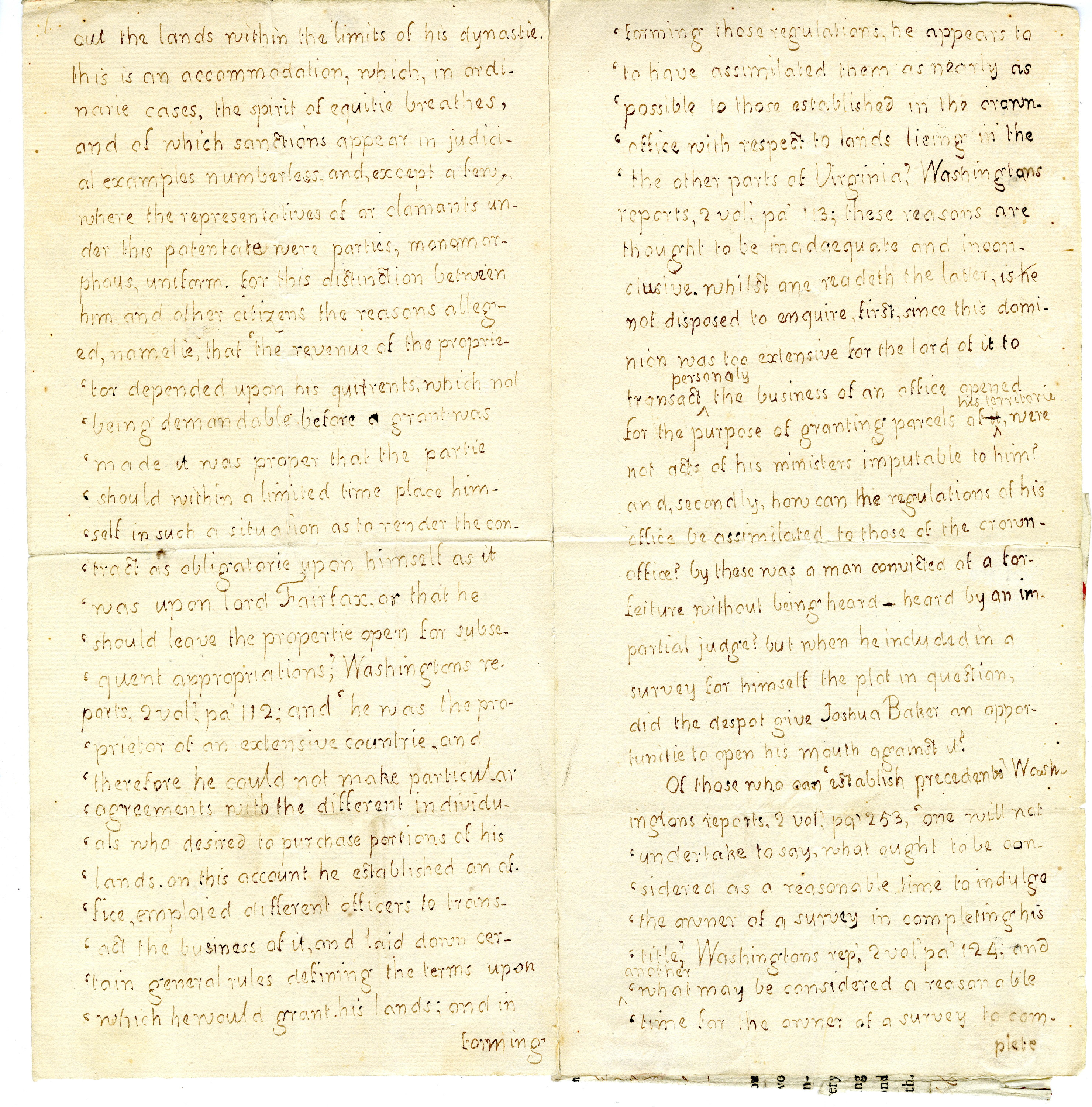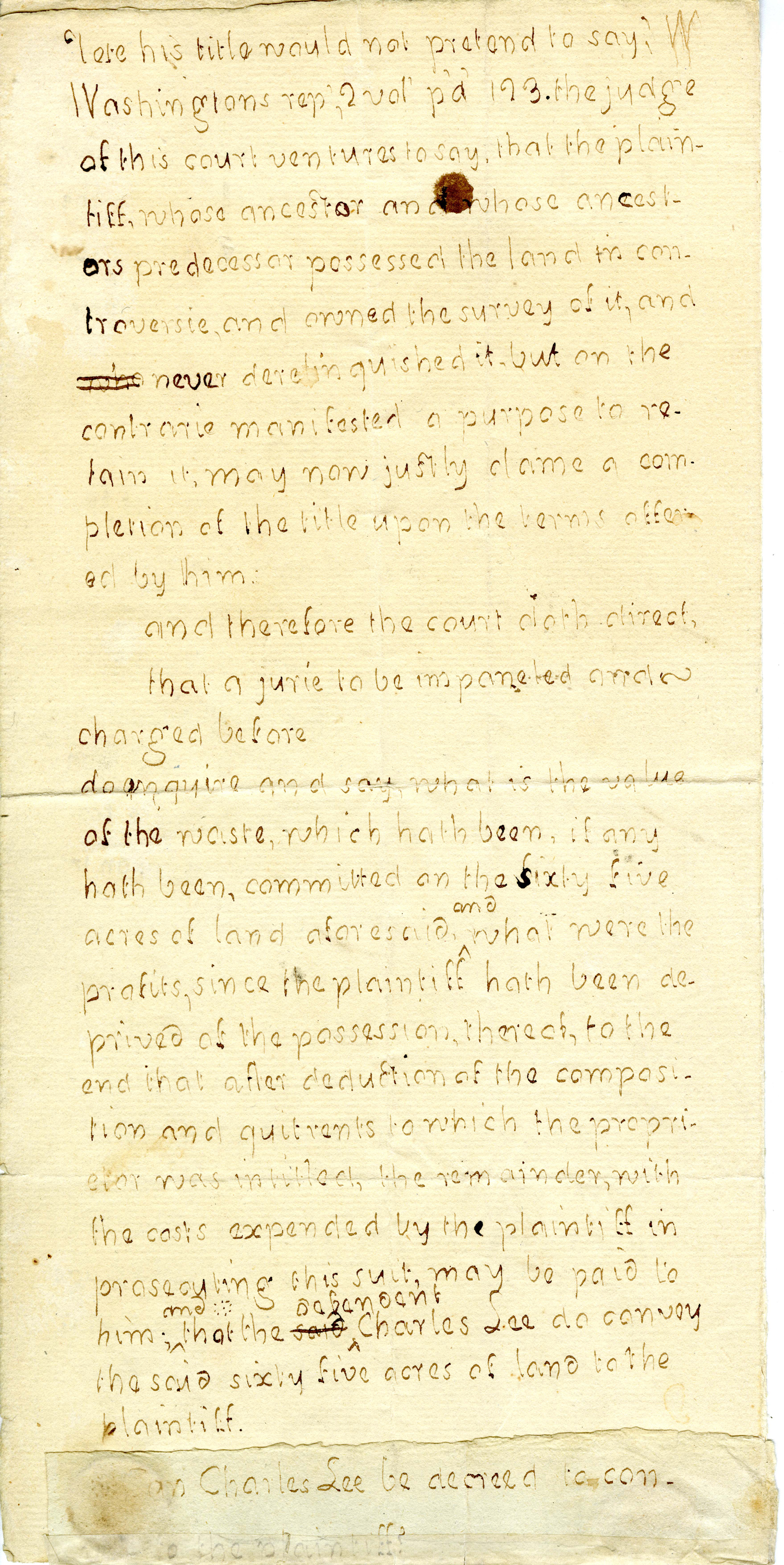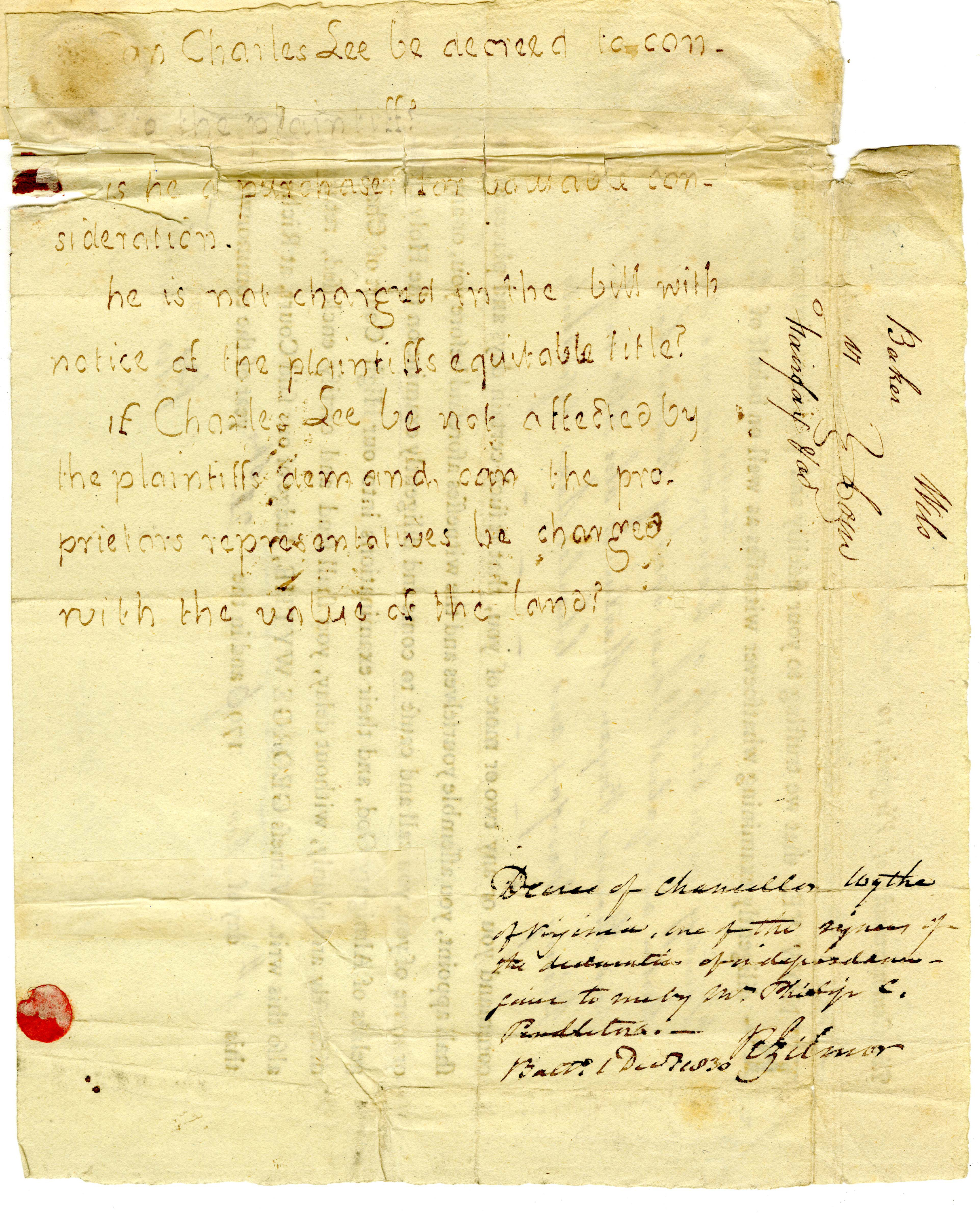Difference between revisions of "Decree in Baker v. Fairfax"
(→Page 5) |
|||
| (14 intermediate revisions by 2 users not shown) | |||
| Line 2: | Line 2: | ||
Wythe's decree from March, 1802 in the case of Baker v. Fairfax.<ref>"Decision of George Wythe in a lawsuit, November 9, 1796." [http://library.haverford.edu/file-id-1037 Charles Roberts Autograph Letters Collection,] [http://library.haverford.edu/places/special-collections/ Quaker & Special Collections, Haverford College,] Haverford, Pennsylvania.</ref> | Wythe's decree from March, 1802 in the case of Baker v. Fairfax.<ref>"Decision of George Wythe in a lawsuit, November 9, 1796." [http://library.haverford.edu/file-id-1037 Charles Roberts Autograph Letters Collection,] [http://library.haverford.edu/places/special-collections/ Quaker & Special Collections, Haverford College,] Haverford, Pennsylvania.</ref> | ||
| − | This series of pages details Wythe's decree in a land dispute. The disputed land was the [[wikipedia:Northern Neck Proprietary|Northern Neck Proprietary]], formerly owned by [[wikipedia:Thomas Fairfax, 6th Lord Fairfax of Cameron|Lord Fairfax]]. In the end, the plaintiff was awarded the land, plus court costs. In addition, the defendant was ordered to pay the plaintiff whatever profits he had unjustly gotten from the land, as well as costs to offset any damages done to it. | + | This series of pages details Wythe's decree in a land dispute. The disputed land was the [[wikipedia:Northern Neck Proprietary|Northern Neck Proprietary]], formerly owned by [[wikipedia:Thomas Fairfax, 6th Lord Fairfax of Cameron|Lord Fairfax]]. In the end, the plaintiff was awarded the land, plus court costs. In addition, the defendant was ordered to pay the plaintiff whatever profits he had unjustly gotten from the land, as well as costs to offset any damages done to it. |
| + | |||
| + | The manuscript is attached with an earlier printed legal form for a [[Commission to Take Depositions, 9 November 1796|commission to take depositions]] in the case from 1796, in the hand of Wythe's clerk, Peter Tinsley. On the back of the commission — [[#Page 5|page five]] displayed here — are Wythe's notes on the case which appear to be separate from his decision. | ||
==Document text, March 1802== | ==Document text, March 1802== | ||
| Line 8: | Line 10: | ||
<blockquote> | <blockquote> | ||
| − | Between Baker, plaintiff, and Denny Fairfax, Charles Lee, and Thomas Bryan Martin and Gabriel Jones, of whom the two last named are executors of Thomas lord Fairfax, defendents, In this cause, the bill of the plaintiff, this day of march, in the year of our lord one thousand eight hundred and two, is taken for confessed against the defendents Denny Fairfax and Charles Lee, who reside out of the limits of this courts jurisdiction, and against the plaintiff hath proceded in the mode prescribed by law. Whom,^ when such are parties; and the same day, the court, after perusing the bill, answers of the other defendents, exhibits and examinations of witnesses, and after considering them with arguments of counsil, pronounced the following sentence: Thomas Berrvick and Joshua Baker in the title of them or either of them to the | + | Between Baker, plaintiff, and Denny Fairfax, Charles Lee, and Thomas Bryan Martin and Gabriel Jones, of whom the two last named are executors of Thomas lord Fairfax, defendents, In this cause, the bill of the plaintiff, this day of march, in the year of our lord one thousand eight hundred and two, is taken for confessed against the defendents Denny Fairfax and Charles Lee, who reside out of the limits of this courts jurisdiction, and against the plaintiff hath proceded in the mode prescribed by law. Whom,^ when such are parties; and the same day, the court, after perusing the bill, answers of the other defendents, exhibits and examinations of witnesses, and after considering them with arguments of counsil, pronounced the following sentence: Thomas Berrvick and Joshua Baker in the title of them or either of them to the sixty five acres of land demanded by the bill were forfeited, might^<sup>have</sup> redemed them in equitie, by compensation of the detriment which the proprietor suffered by failure^<sup>of those men</sup> to observe the rules prescribed by him in parceling out |
</blockquote> | </blockquote> | ||
| Line 16: | Line 18: | ||
<div style="overflow: hidden;"> | <div style="overflow: hidden;"> | ||
<blockquote> | <blockquote> | ||
| − | out the lands within the limits of his dynastie. this is an accommodation, which, in ordinarie cases, the spirit of equitie breathes, and of which sanctions appear in judicial examples numberless, and, except a few, where the representatives of our claimaints under this potentate were parties, monomorphous, uniform. for this distinction between him and other citizens the reasons alleged, namelie, that the revenue of the propritor depended upon his quitrents, which not being demandable before a grant was made it was proper that the partie should within a limited time place himself in such a situation as to render the contract as obligatorie upon himself as it was upon lord Fairfax, or that he should leave the propertie open for subsequent appropriations; Washingtons reports, 2vol:pa'112; and ' he was the proprietor of an extensive countrie, and therefore he could not make particular agreements with the different individuals who desired to purchase portions of his lands. on this account he established an of.fice, emploied different officers to transact the business of it, and laid down certain general rules defining the terms upon which he would grant his lands; and in | + | out the lands within the limits of his dynastie. this is an accommodation, which, in ordinarie cases, the spirit of equitie breathes, and of which sanctions appear in judicial examples numberless, and, except a few, where the representatives of our claimaints under this potentate were parties, monomorphous, uniform. for this distinction between him and other citizens the reasons alleged, namelie, that the revenue of the propritor depended upon his quitrents, which not being demandable before a grant was made it was proper that the partie should within a limited time place himself in such a situation as to render the contract as obligatorie upon himself as it was upon lord Fairfax, or that he should leave the propertie open for subsequent appropriations; [[Reports of Cases Argued and Determined in the Court of Appeals of Virginia|Washingtons reports]], 2vol:pa'112; and ' he was the proprietor of an extensive countrie, and therefore he could not make particular agreements with the different individuals who desired to purchase portions of his lands. on this account he established an of.fice, emploied different officers to transact the business of it, and laid down certain general rules defining the terms upon which he would grant his lands; and in |
::::::::::::::::::::forming | ::::::::::::::::::::forming | ||
</blockquote> | </blockquote> | ||
| Line 25: | Line 27: | ||
<div style="overflow: hidden;"> | <div style="overflow: hidden;"> | ||
<blockquote> | <blockquote> | ||
| − | forming these regulations, he appears to to have assimilated them as nearly as possible to those established in the crown office with respect to lands lieing in the the other parts of Virginia? Washingtons reports, 2vol:pa' 113; these reasons are thought to be inadequate and inconclusive. whilst one readeth the latter, is he not disposed to enquire, first, since this dominion was too extensive for the lord of it to transact^<sup>personaly</sup> the business of an office opened for the purpose of granting parcels of <s>it</s>^<sup>his territorie</sup>, were not acts of his ministers imputable to him? and, secondly, how can the regulations of his office be assimilated to those of the crown office? by these was a man convicted of a forfeiture without being heard _ heard by an impartial judge? but when he included in a survey for himself the plot in question, did the despot give Joshua Baker an opportunitie to open his mouth against it? Of those who can establish precedential Washingtons reports, 2vol:pa253, one will not undertake to say, what ought to be considered as a reasonable time to indulge the owner of a survey in completing his title; Washingtons rep. 2vol'pa'124; and what may be considered a reasonable time for the owner of a survey to complete | + | forming these regulations, he appears to to have assimilated them as nearly as possible to those established in the crown office with respect to lands lieing in the the other parts of Virginia? [[Reports of Cases Argued and Determined in the Court of Appeals of Virginia|Washingtons reports]], 2vol:pa' 113; these reasons are thought to be inadequate and inconclusive. whilst one readeth the latter, is he not disposed to enquire, first, since this dominion was too extensive for the lord of it to transact^<sup>personaly</sup> the business of an office opened for the purpose of granting parcels of <s>it</s>^<sup>his territorie</sup>, were not acts of his ministers imputable to him? and, secondly, how can the regulations of his office be assimilated to those of the crown office? by these was a man convicted of a forfeiture without being heard _ heard by an impartial judge? but when he included in a survey for himself the plot in question, did the despot give Joshua Baker an opportunitie to open his mouth against it? Of those who can establish precedential Washingtons reports, 2vol:pa253, one will not undertake to say, what ought to be considered as a reasonable time to indulge the owner of a survey in completing his title; Washingtons rep. 2vol'pa'124; and what may be considered a reasonable time for the owner of a survey to complete |
</blockquote> | </blockquote> | ||
</div> | </div> | ||
| Line 34: | Line 36: | ||
<div style="overflow: hidden;"> | <div style="overflow: hidden;"> | ||
<blockquote> | <blockquote> | ||
| − | 'lete his title would not pretend to say; Washingtons rep:2vol'p'a' 123. the judge of this court ventures to say, that the plaintiff, whose ancestor and whose ancestors predecessor possessed the land in controversie, and owned the survey of it, and <s>who</s> never derelinquished it. but on the contrarie manifested a purpose to retain it, may now justly clame a completion of the title upon the berms offered by him. and therefore the court doth direct, that a jurie to be impaneled and charged before do inquire and say, what is the value of the waste, which hath been, if any hath been, committed on the sixty five acres of land aforesaid, ^<sup>and</sup> what were the profits, since the plaintiff hath been deprived of the possession, thereof, to the end that after deduction of the composition and quitrents to which the proprietor was entitled, the remainder, with the costs expended by the plaintiff in prosecuting this suit, may be paid to him; ^<sup>and</sup> that the <s>said</s>^<sup>defendent</sup> Charles Lee do convey the said sixty five acres of land to the plaintiff. | + | 'lete his title would not pretend to say; [[Reports of Cases Argued and Determined in the Court of Appeals of Virginia|Washingtons rep]]:2vol'p'a' 123. the judge of this court ventures to say, that the plaintiff, whose ancestor and whose ancestors predecessor possessed the land in controversie, and owned the survey of it, and <s>who</s> never derelinquished it. but on the contrarie manifested a purpose to retain it, may now justly clame a completion of the title upon the berms offered by him. and therefore the court doth direct, that a jurie to be impaneled and charged before do inquire and say, what is the value of the waste, which hath been, if any hath been, committed on the sixty five acres of land aforesaid, ^<sup>and</sup> what were the profits, since the plaintiff hath been deprived of the possession, thereof, to the end that after deduction of the composition and quitrents to which the proprietor was entitled, the remainder, with the costs expended by the plaintiff in prosecuting this suit, may be paid to him; ^<sup>and</sup> that the <s>said</s>^<sup>defendent</sup> Charles Lee do convey the said sixty five acres of land to the plaintiff. |
<center> | <center> | ||
[Next page attached to the bottom of this page] | [Next page attached to the bottom of this page] | ||
| Line 45: | Line 47: | ||
<center> | <center> | ||
[Page attached to bottom of previous page] | [Page attached to bottom of previous page] | ||
| + | </center> | ||
| + | |||
| + | <center> | ||
| + | :::Wils[?]<br /> | ||
| + | Baker<br /> | ||
| + | :v. } Com[?]<br /> | ||
| + | Fairfax & [ad?] | ||
</center> | </center> | ||
| Line 50: | Line 59: | ||
<div style="overflow: hidden;"> | <div style="overflow: hidden;"> | ||
<blockquote> | <blockquote> | ||
| − | Can Charles Lee be decreed to con | + | Can Charles Lee be decreed to con[sider?] to the plaintiff? |
| + | |||
| + | is he a purchaser for payable consideration. he is not charged in the bill with notice of the plaintiffs equitable title? if Charles Lee be not affected by the plaintiffs demand, can the proprietors representatives be charged with the value of the land? | ||
| − | |||
| − | Decree of Chancellor Wythe of Virginia, one of the signers of the declaration of independence and given to me by Philip C. Pendleton. - R | + | :Decree of Chancellor Wythe of Virginia, one of the signers of the declaration of independence and given to me by Philip C. Pendleton. - R Gilmor |
</blockquote> | </blockquote> | ||
</div> | </div> | ||
| Line 62: | Line 72: | ||
<div style="overflow: hidden;"> | <div style="overflow: hidden;"> | ||
*[[Commission to Take Depositions, 9 November 1796]] | *[[Commission to Take Depositions, 9 November 1796]] | ||
| + | *''[[Reports of Cases Argued and Determined in the Court of Appeals of Virginia]]'' | ||
</div> | </div> | ||
| Line 69: | Line 80: | ||
[[Category: Letters and Papers]] | [[Category: Letters and Papers]] | ||
| + | [[Category:Cases]] | ||
Latest revision as of 10:38, 5 October 2016

Wythe's decree from March, 1802 in the case of Baker v. Fairfax.[1]
This series of pages details Wythe's decree in a land dispute. The disputed land was the Northern Neck Proprietary, formerly owned by Lord Fairfax. In the end, the plaintiff was awarded the land, plus court costs. In addition, the defendant was ordered to pay the plaintiff whatever profits he had unjustly gotten from the land, as well as costs to offset any damages done to it.
The manuscript is attached with an earlier printed legal form for a commission to take depositions in the case from 1796, in the hand of Wythe's clerk, Peter Tinsley. On the back of the commission — page five displayed here — are Wythe's notes on the case which appear to be separate from his decision.
Contents
Document text, March 1802
Page 1
Between Baker, plaintiff, and Denny Fairfax, Charles Lee, and Thomas Bryan Martin and Gabriel Jones, of whom the two last named are executors of Thomas lord Fairfax, defendents, In this cause, the bill of the plaintiff, this day of march, in the year of our lord one thousand eight hundred and two, is taken for confessed against the defendents Denny Fairfax and Charles Lee, who reside out of the limits of this courts jurisdiction, and against the plaintiff hath proceded in the mode prescribed by law. Whom,^ when such are parties; and the same day, the court, after perusing the bill, answers of the other defendents, exhibits and examinations of witnesses, and after considering them with arguments of counsil, pronounced the following sentence: Thomas Berrvick and Joshua Baker in the title of them or either of them to the sixty five acres of land demanded by the bill were forfeited, might^have redemed them in equitie, by compensation of the detriment which the proprietor suffered by failure^of those men to observe the rules prescribed by him in parceling out
Page 2

Page 3
Page 4

Page 5
[Page attached to bottom of previous page]
- Wils[?]
- Wils[?]
Baker
- v. } Com[?]
Fairfax & [ad?]

See also
References
- ↑ "Decision of George Wythe in a lawsuit, November 9, 1796." Charles Roberts Autograph Letters Collection, Quaker & Special Collections, Haverford College, Haverford, Pennsylvania.